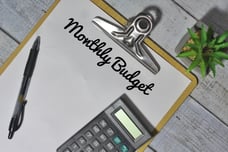The new year has begun with continued economic uncertainty for many people, but the uncertainty caused by Covid-19 shouldn’t cause you to forgo setting financial goals. While the crisis will likely alter your current financial position and immediate goals, setting those goals remains as important as ever (if not even more important). If you don’t know where to start, here are some financial goals to consider for 2021.

1. Strengthen Your Emergency Fund
An emergency fund serves as a first line of defense against the unexpected, and there’s certainly plenty of unexpected emergencies right now. Even if you aren’t currently impacted by Covid-19, there’s a good chance that you still could be -- and having a strong emergency fund in place could help you weather the storm.
 No matter what the state of your emergency fund is, strengthening it will provide greater assurance in the weeks and months to come. If you do manage to over-fund it, you can always readjust the fund once the pandemic eventually subsides.
No matter what the state of your emergency fund is, strengthening it will provide greater assurance in the weeks and months to come. If you do manage to over-fund it, you can always readjust the fund once the pandemic eventually subsides.
There are a few ways you might strengthen your emergency fund:
- Use part or all of a stimulus check to bolster the fund.
- Move the fund to a high-yield savings account that will pay interest.
- Set up direct payments from your paycheck to the fund.
In most situations, professionals recommend having an emergency fund that’s between 3 and 6 months of your living expenses. In a time like this, there’s nothing wrong with growing an even larger fund if you’re able to. If you’re not in that position, setting aside even a little is better than having no emergency fund in place.
2. Trim Your Monthly Budget
The two methods of increasing cash flow are to increase income and to decrease expenses. With conventional jobs, gig work and side hustles are all in scarce supply for many, decreasing expenses tends to be the way to improve cash flow right now.
 Take a look at your monthly budget, and look for various ways that you can reduce what you spend. Most budgets have at least a few places where expenses can be trimmed. You might look to:
Take a look at your monthly budget, and look for various ways that you can reduce what you spend. Most budgets have at least a few places where expenses can be trimmed. You might look to:
- Reduce how much you spend on subscriptions each month.
- Lower the number of times you order take-out or delivery.
- Minimize impulsive online spending (consider waiting 24 hours before buying).
Of course, now is the time to start a monthly budget if you don’t already have one. List out all of your expected income sources and expenses for a month, and monitor them as paychecks are deposited and bills are paid. Your projections won’t be perfect, and that’s alright. Their purpose is simply to help you more clearly see your financial picture.
3. Reduce Your Debt Burden
If you have outstanding debts (and most do), reducing your debt will simultaneously help you free up money in the short-term and better improve your overall situation in the long-term. Any amount that you can reduce your debt by will better enable you to handle a Covid-19 financial emergency.
Depending on your debt load and financial situation, you have a few ways to potentially tackle debt. Either a one-time windfall or regular income can be used to:
- Pay Down Outstanding Balances: Paying down outstanding secured loan balances reduces your credit utilization, improving your credit score and minimizing how much interest you pay in the long term. It allows you to own your home and cars instead of the bank owning them. This can relieve the worry about the threat of foreclosure or repossession.
- Accelerate Your Debt Settlement Plan: Making an additional one-time payment to your debt settlement plan can greatly accelerate your progress. Depending on your situation and the amount you pay, you may be able to settle one or more debts with the additional payment. Your stimulus check or tax return could be a source of funds for such an extra payment.
Set a Financial Goal for 2021
Do any of these describe progress that you’d like to make during 2021? Make one your financial goal for this year, and you’re bound to be better prepared for whatever the Covid-19 pandemic (or other things) might throw your way.






